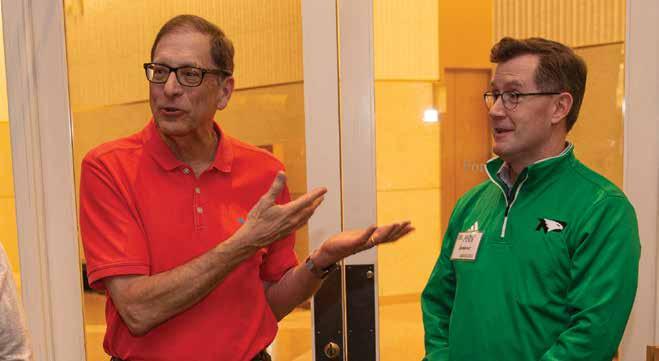
10 minute read
On Campus
Stronger together
As we all work to keep our physical distance during the COVID-19 pandemic, the UND community unites in supporting our students, alumni, faculty, and staff. For more updates on the campus response, visit blogs.UND.edu/coronavirus.
Advertisement
Series confronts aviation industry downturn
The Aviation Industry Speaker Series is confronting the current realities facing aviation graduates and students. Learn more at aero.UND.edu/aviation/industry-speaker-series.html.
Researchers track, map, and model pandemic
Several efforts at UND are documenting COVID-19 on a more granular level than many of the global models often referenced by national media.
UND coalition brings drones into the coronavirus fight
Sandeep Singhal, Assistant Professor in the School of Medicine & Health Sciences and the School of Electrical Engineering & Computer Science; Department of Geography instructor Joseph Mbuh; graduate geography student Anai Caparo; and Ryan Adams, director of the School of Electrical Engineering & Computer Science, are conducting separate studies of the virus’s trajectory and help decision-makers tackle crucial considerations.
The Center for Innovation and Research Institute for Autonomous Systems (RIAS) are partnering in a coalition of unmanned aerial system (UAS) industry leaders in the fight against the novel coronavirus.
Flight tests operated by Grand Forks-based drone service provider SkySkopes are underway to test the abilities of drones to spray disinfectants, deliver priority supplies and the capacity of the drone to sense body temperatures remotely.
“We see this as our duty to develop ways to kill the virus, as well as find ways to get the United States back online with drones,” said Matt Dunlevy, ’10, President and CEO of SkySkopes. “I have not seen a partnership like this before, and we have a mission set like I’ve never seen before.”
A CANCELED COMMENCEMENT CLASS OF 2020
For some, cancellation of graduation ceremonies brings back memories of the last time it happened on the UND campus: during the flood of 1997.
By Dima Williams
Kim Dietrich heard the news on TV: commencement at the University of North Dakota had been canceled. At the time, the announcement didn’t really bother the dietetics senior. Married and slightly older than the average college student, Dietrich would later recall “other heavy life things” such as her parents and grandparents’ wellbeing that had loomed larger in her mind.
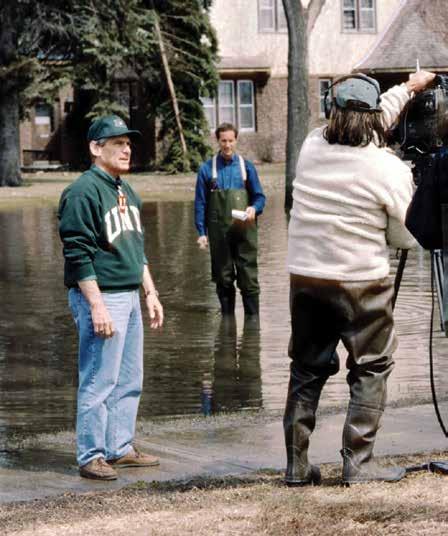
UND President Kendall Baker is interviewed by a CNN news crew during the flood of 1997.
The year was 1997. Spring floodwater had surged over Grand Forks and East Grand Forks, shuttering businesses, closing UND’s campus, forcing thousands of residents to evacuate and cutting the academic year short.
The historic 1997 flood followed a severe winter, when roughly 10 feet of snow fell and late-spring blizzards battered the Red River Valley. Yet, Brandon Scheel, who graduated with a degree in business management that year, said few could predict the unusual fury of the Red River of the North and the Red Lake River as they spilled from their shallow beds. “We didn't expect it to get nearly as bad as it got,” he said. “We just thought it was going to be a bad flood year.”
“It came very quickly,” says Bob Boyd, who served as Dean of the Division of Continuing Education at the time. “I believe that major evacuation was on April 18 or 19. That's when most of Grand Forks was evacuated.”
Seniors, who were a mere month away from graduation, finished their courses (like the rest of the students) prematurely, their mid-semester grades turning into final marks. There was no spring commencement, which, if it had been another regular year, would have transpired at the Hyslop Sports Center.
“I remember feeling really mixed emotions,” said Scheel. “Part of me was still the young student, saying ‘Oh, great, no finals.’ And part of me was, ‘Wait a minute, no graduation, no chance to say goodbye to a lot of people.’”
Scramble to push forward
As the water rose, Dietrich joined the dietetics program’s effort to help the flood fight by fixing sandwiches for first responders. She and her husband joined scores of other civilians sandbagging. Earlier that spring, Dietrich was busy with final school projects and practicums. She had not realized the direness of the circumstances until then.
“My husband and I took a drive one night and I was, ‘Oh my, we have an issue,’” she said.
The flood spared the apartment complex where Scheel lived in his final year at UND. His girlfriend at the time, though, resided in East Grand Forks. Scheel drove nearly 70 miles south to Fargo, where he crossed the Red River into Minnesota, and returned north to help her escape the flood.
From disappointment to lifelong connection
The cancellation of the commencement ceremony also strained administrators, faculty and staff, who missed the opportunity to rejoice in their students’ accomplishments, Boyd recalled.
“We were reminded that commencement is more complicated than just the ceremony itself,” Boyd said. “Commencement was always a validation of the purpose of the University.”
Dietrich gathered with her family in their lake home, while Scheel attended a “fake graduation ceremony” organized by his mom, who had even crafted a makeshift diploma for him.
He would later get the real thing in the mail. So would a slew of other 1997 seniors. Some opted to participate in a joint spring-summer commencement on August 1, when North Dakota’s three members of Congress gave special remarks.
Even if the spring flood of 1997 separated seniors from one another, their university and professors in a time that should have been all about hope and positivity, the experience united that year’s class.
“We have this shared connection with everybody that graduated in 1997 from UND,” said Scheel. “Some of us got out of there with all of our belongings. Some of us got out of there with none of our belongings. But you have this shared experience and something that continues to bring you together decades later.”
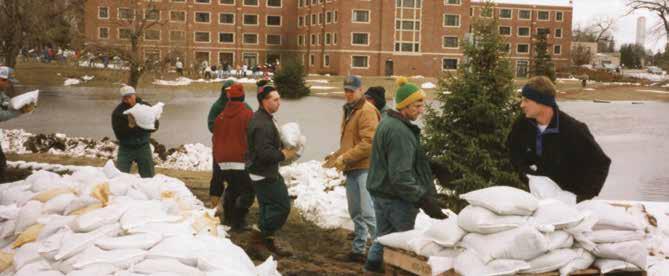
Students and volunteers sandbag near Smith Hall in April 1997.
BOB BOYD, ’74, ’79 FORMER VP, STUDENT & OUTREACH SERVICES DEAN, DIVISION OF CONTINUING EDUCATION
That could very well be the case for the UND graduates of 2020 as the coronavirus pandemic has shifted instruction to remote delivery and moved commencement to a virtual alternative.
“In the absence of traditional ceremonies, it’s important that the University create a virtual commencement to honor and celebrate the academic accomplishments of our graduates and to engage them and their families to help bring closure to their UND experience,” said Fred Wittmann, UND director of events. ///
FEAST OF NATIONS
The 58th Annual Feast of Nations took place March 7 at the Alerus Center. The spectacular event saw 1,000 people enjoy an evening of food, fashion, music, dance and culture, all of it presented by the UND International Organization and UND.
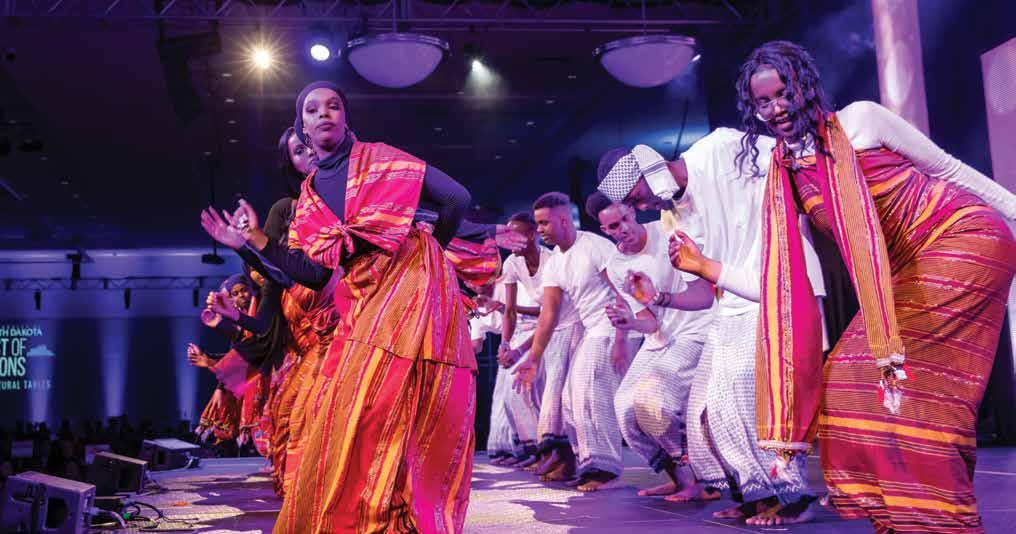
Photo by Mike Hess
First in the world
The University of North Dakota is making history by offering the world’s first doctoral program in Indigenous health.
The Ph.D. degree launched this spring, and prospective students have been inquiring about the program for months, said Dr. Donald Warne, director of the Indians Into Medicine (INMED) and Master of Public Health (MPH) programs at UND, who led the push for the new program.

Dr. Don Warne discusses American Indian health policy with UND Master of Public Health Program students at the School of Medicine & Health Sciences. Warne led the push for UND’s new doctoral program in Indigenous health.
Photo by Mike Hess
“There is a need for well-trained administrators with a deep understanding of Indigenous health issues,” said Warne, who also serves as professor of family and community medicine as well as associate dean of diversity, equity and inclusion at the UND School of Medicine & Health Sciences. “There is nothing like that in the world.”
With a holistic vision that starts with educating middle school students and taking them through high school, college and beyond, Warne said that UND will offer the world’s only Indigenous health doctoral program, the only online bachelor’s/ master’s degree combination in public health, and one of very few MPH degrees with a focus on Indigenous health.
As of May 2019, INMED has graduated 244 American Indian/Alaska Native physicians, making it the most successful Indigenous medical training program internationally and in history. The new program will be linked to the INMED and MPH programs. ///
Space Force leader visits campus
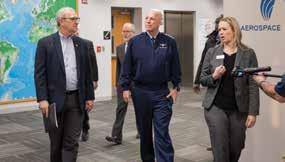
Photo by Connor Murphy
It’s the sixth branch of the U.S. Armed Forces, the first separate service created since the Air Force’s inception in 1947.
And in the weeks after the establishment of the U.S. Space Force, the first university that the new service’s chief chose to visit was UND.
Gen. John W. “Jay” Raymond, the Space Force’s first Chief of Space Operations, visited UND on Jan. 10 at the invitation of Sen. Kevin Cramer, R-N.D., where he met with University officials and members of the University’s Air Force and Army ROTC detachments.
He also addressed an audience of ROTC and Space Studies students and faculty, emphasizing how much the American military and the rest of the country’s way of life relies on the use of space-based communication technologies.
Calling for a university-affiliated research Daniel Kwasi Adjekum, an assistant professor School of Aerospace Sciences, has been Adjekum, an consortium specifically to aid the advancement of Space Force-adjacent technologies, Raymond expressed admiration for the University’s ongoing research efforts that readily connect to matters of national security.
Raymond, whose wife, Mollie (Garry), is a 1987 and 1989 UND grad, touched on how UND could contribute to the Space Force’s mission of protecting the country's assets in space.
“It’s a critical and exciting time to be in the space business,” Raymond said. “There is a lot of great research going on [at the University]; there’s a Space Studies program here. As we develop future Space officers, I think this school has a
A leader in oil research
of aviation in the UND John D. Odegard awarded $755,000 to support research as part of a larger $7.25-million Gulf Research Program. The initiative aims to develop an improved culture of safety in the oil and gas industry.
great opportunity.” /// internationally respected aerospace researcher, is uniquely qualified to transfer knowledge and skills from the aviation domain to oil and gas work. He has published extensively on safety Daniel Kwasi Adjekum culture in aviation and is a highly sought source on the topic for major media networks.
With UND Continental Resources Distinguished Professor of Petroleum Engineering Vamegh Rasouli as a coprincipal investigator, the UND research team represents a strong interdisciplinary partnership between aerospace and engineering.
World’s first drilling lab
UND will soon host the world’s largest – and only – full scale oil drilling and completion lab.
“This drilling and completion Vamegh Rasouli laboratory, when fully completed, will be a $40-million experimental facility that does not exist anywhere else in the world,” said Rasouli.
Petroleum engineering students will be able to simulate general drilling and deep drilling, along with testing different rocks, including shale. They will also be able to simulate oil reservoir conditions, including temperature, pressure and fluid flow. Doctoral students will be able to perform research that benefits the state of North Dakota. ///
UND enters esports game

A new collegiate esports program will provide students with a collaborative, competitive and educational experience through gaming during their time at UND.
Photo by Mike Hess
The grand opening for the Nexus Esports lounge at the UND Wellness Centered showcased how the University of North Dakota is “leveling up” for some serious competition.
Just inside the entrance to the Wellness Center, the Nexus Esports lounge features 12 gaming PCs with more than 15 titles installed, including some of the biggest games in esports. The esports program is supported through the College of Education and Human Development.
King comes to UND with experience in creating esports ecosystems at other institutions and supporting varsity programs. Combined with his tenure as a manager and coach for a semi-professional League of Legends team, King plans to collaborate with students, faculty and staff at UND to create a robust, diverse and competitive gaming scene in North Dakota. ///



